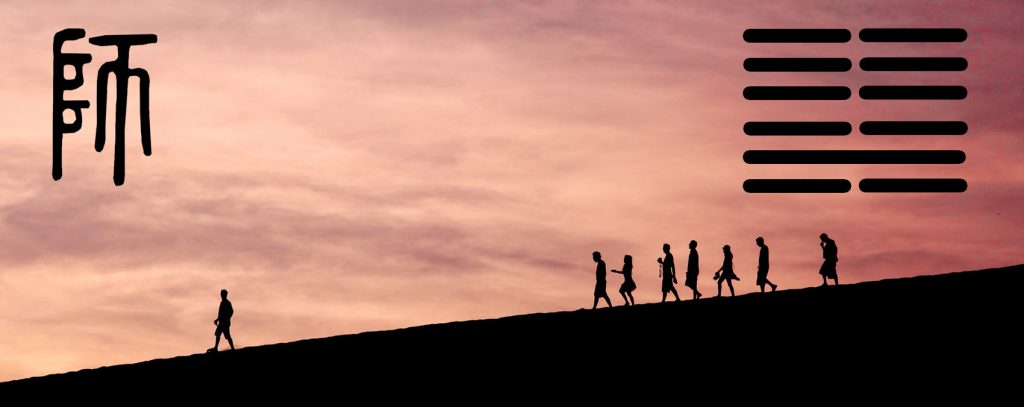Earth above – Water below
Hexagram 7 is called Shi and when translated meant “multitude”, later associated with teachers and army troops. Hence the names: The Army, Multitude, Military Leadership, Discipline, The Militia, among others. Within society there needs to be some kind of structured behavior to keep some kind of peaceful routine. The situation in this hexagram centers on the use of force, when to use it and/or the management of forces as a coordinated whole.
Breaking down the symbolism of the 3-line trigrams helps with understanding the ancient teachings:

Trigram Water is shown in the image as the bottom 3 lines (below right), representing the inner situation. The instinct and feelings of Water run deep but there is no regard to individual causes because it is only itself and can only go its own way. Water, however, easily changes its shape and makes the most of every opportunity. If the internal leadership component lacks discipline or is unable to clearly oversee the entire situation there is peril of making the battle emotional or disorganized. The ancients saw an army as a dangerous thing, so the king trained the peasants as soldiers and thought of them as “water within the earth” – a hidden force if needed, but an outward show of peacefulness to discourage war.
Trigram Earth is on top of trigram Water, showing the externalized situation (top 3 lines of image below right). Water is expressing itself out through the receptive Earth. Earth is then shaped, defended or protected by Water. Earth, in this case, is referring to the present reality of you, your situation or the environment.
The ancient ideograph on the upper left portion of the image below: The left portion is a waving or rolling idea representing a multitude. The right portion means “to go around” or could indicate a highly ranked leader with a skirt. Putting them together, the ideograph takes on the meaning of a multitude of people circling around a pivot point. The pivot point itself symbolizes a teacher, master, a highly placed person or a leader. The multitude portion also suggests regular people as well as an army (the ancient Chinese did not have separate armies, the peasants were trained and only called to war duty if necessary).

In summary: Water flowing within the Earth means either being one of the multitude or its leader in fighting for and defending that which has a common value. This situation includes working with other people or mustering components within your own character. The I Ching originators knew that in life one will need to muster their forces and organize for reasons of protection. They did not condone the use of force with two exceptions: to overthrow a tyrant or to protect against invasion. They were clear, however, that whoever is the leader, that person needed to maintain a high standard of discipline and clarity to be successful.
Following are a few ideas for interpretations of each line:
Line 1 – There is no suggestion whether one should proceed or withdraw at this time. Instead, the guidance is: before action, make sure the strategy is for a worthy cause and there is a thorough comprehension of all that is involved. Overseeing is essential to make sure all details are correct to give the endeavor the power and the ability to hold together.
Line 2 – This position is a favorable one showing competence – for example, being a responsible authority who nourishes and controls their multitude while still knowing their place earns the trust of those they lead (while also being responsive to and gaining confidence from one’s own superiors).
Line 3 – There is a suggestion this situation suffers the lack of proper leadership; while it may look like it is winning, what is won is not of value. What is the leadership mindset occupied with? Is it a living reality or obsolete, illusory thoughts and feelings? Let go; a better direction is needed.
Line 4 – Knowing one’s own limitations shows wisdom. An overly disciplined mind-set may urge rushing on with a battle; balanced discipline knows that it is perhaps time to retreat, relax and regroup.
Line 5 – Although this cause may be a noble one (meaning the battle is defensive rather than an attack) one must watch out that leadership is not confused by those they are leading. Learn how to delegate, watch for inflexibility, take chances when they appear and do not depend too much on the rules.
Line 6 – Infantry is from a French word meaning child. The leader develops the skills of those in his/her charge. When victory has been gained, a good ruler ensures those who served well are rewarded with more power and those who did not serve well are given payment for their effort, but no longer employed.
